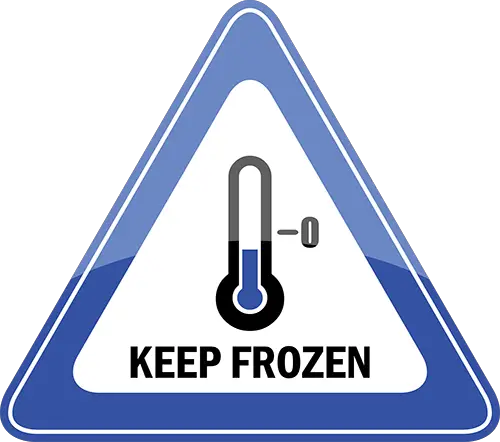Freezing Egg Salad is Not Recommended (Here’s Why)
Egg salad is a classic, easy-to-make staple snack typical in picnics and family outings. Because it’s a healthy snack and an excellent source of protein, many people make more than they can consume at one time. Whether you have a surplus of egg salad from your recent outing or you’re planning to make the recipe soon, perhaps you might be wondering if it’s okay to freeze it for later.
Freezing egg salad is not recommended. The main ingredients, mayonnaise, and eggs do not freeze well and the taste and consistency will be significantly altered once frozen and thawed. For the best results, you can refrigerate egg salad for up to 3-5 days before it starts to go bad.
So, let’s discuss the shelf life of egg salad, its ingredients, proper storage, and signs of spoilage. I’ll also give you tips on what to do with your extra servings of egg salad to avoid food waste.
Why Does Egg Salad Go Bad?
Egg salad has two primary ingredients that are crucial in determining the duration of time when it is safe to eat: egg and mayonnaise. Although this recipe has other elements such as chives and paprika, egg and mayonnaise remain the two significant components that attract the most bacteria.
Egg salad goes bad because it contains eggs and mayonnaise, and both are prone to bacterial and fungal growth. These ingredients require proper storage to ward off harmful microorganisms, so keep them refrigerated and sealed tight to keep out pesky bacteria.

Mayonnaise is an oil-in-water emulsion formed by combining oil with vinegar, mustard, and egg yolk. This ingredient is prone to bacterial growth because it’s made of eggs, another main ingredient of egg salad.
According to registered dietician Taylor Jones, eggs as a perishable product eventually rot because of the natural presence of bacteria like salmonella.
Together, these two components cause egg salad to sour if not stored and maintained correctly.
How Long Does Egg Salad Last?
Temperature is the best indicator of egg salad’s shelf life. As with all perishable food, the rule is that the colder the temperature is, the longer egg salad will last.
Egg salad will last around 2 hours at warm or room temperature, but it can last for up to 5 days if you keep it chilled in a refrigerator. In addition, egg salad will last longer if you keep it sealed in an airtight container.
That means that at room temperature, you can only leave your egg salad for 2 hours before it spoils, considering that bacteria thrives in heat, particularly at 40 to 140° Fahrenheit (4.44 to 60° Celsius), according to the Food and Drug Administration.
If you’re packing it for a road trip or a picnic, especially on a warm summer day, then the maximum storage time might be shorter. To avoid spoilage in such cases, make sure to consume your egg salad in less than 2 hours. Bringing an insulated cooler to store your egg salad in safely is also recommended.
On the other hand, cooling is scientifically the best way to preserve almost all food, including egg salad. So if ever you’re left with a surplus of egg salad, in an amount that is still good for the next few days, the good news is you can store it in the refrigerator for later consumption, but only for a short time.
Following the USDA guidelines, you can store egg salad in the fridge and still eat it for three to five days. However, keeping it refrigerated beyond five days will likely lead to bacterial contamination.
What Happens If You Freeze Egg Salad?
Similar to all food, of course, you can freeze egg salad. However, whether you should is another matter. Well, here’s a short answer: you shouldn’t. It’s not advisable to freeze egg salad because mayonnaise, an emulsion, is sensitive to low temperatures found in freezers.
If you freeze egg salad, the mayonnaise’s components will separate. That means, once you thaw it from the freezer, the overall flavor of your egg salad will change, and the texture will be watery and clumpy.
This advice applies explicitly to homemade egg salad, which uses all-natural ingredients.
According to nutritionist Elisa Chan, homemade recipes with natural ingredients are more prone to bacteria development than mass-produced alternatives bought in the supermarket. That’s because the latter usually include added preservatives and chemical protectors.
Remember that freezing egg salad will not kill bacteria, but rather, it will only slow them down and make them dormant. Once you take the recipe out from the freezer and into room temperature, the bacteria will begin multiplying again.
This “solution” can make your frozen salad susceptible to salmonella bacteria, which can potentially lead you to acquire foodborne illnesses. So, it’s essential to be mindful of the maximum shelf life of your egg salad and store it properly.
How To Properly Store Egg Salad
To slow down the progression of bacteria on your egg salad, you must store it correctly.

The best way to do so is to refrigerate it in a clean and sealed airtight container. I recommend the M MCIRCO Container Set from Amazon for this type of storage. The set comes in 10 containers of multiple sizes, and its snap locking lids with silicone will keep your food fresh inside the refrigerator for long periods.
When transferring egg salad to the container, make sure that the spoon you use is clean. Using an unwashed spoon that came directly from one’s mouth will bring a massive amount of bacteria to your food.
Also, double-check if the container is durable and tightly covered because letting air inside will invite more bacteria.
You can also add a tiny amount of vinegar or lemon extract that’ll serve as a natural preservative to help your egg salad reach the maximum five-day storage time.
How To Tell If Your Egg Salad Is Spoiled
After removing your egg salad from the fridge within three to five days, you shouldn’t immediately eat it, as you’ll need to check for spoilage signs first. If you skip the checking part, you may develop food poisoning and other digestive problems.
You can tell if your egg salad is already rancid by looking at two main factors:
- Smell. If you take out the egg salad from the container and it has a rotten or sulfur-like odor, your best bet is that it’s already rancid. As eggs produce hydrogen sulfide gas, a natural decay product, they’ll directly smell foul when rotten. That’s why if your egg salad has an unpleasant smell, you shouldn’t think twice and discard it instead.
- The appearance of mold. If you see green or gray spots appearing on your egg salad after three to five days, you must recognize that it’s not safe to eat for a minute longer. As a general rule, if any food changes appearance from when you left it in the fridge to store, you should throw it away immediately.
Still, smell and mold appearance aren’t the sole indicators of staleness and bacterial growth in egg salad. Even if it has no mold, unpleasant odor, or changes in how it looks, the safest course of action is to still throw it out after five days since the probability of you getting sick from bacterial infection increases as each day passes.
What To Do With Your Extra Egg Salad
Got any leftover egg salad that you think you won’t be able to consume within three to five days? Well, there are still some things you can do to avoid wasting this delicious recipe.
- If you’re going on a picnic, pack additional servings for other picnic-goers you’ll see around the area.
- You can also give out some take-home sandwiches for your friends to enjoy.
- If you’re going on a road trip, make extra sandwiches and hand them to homeless people you come across on the streets. It’ll surely make a lot of difference in their life.
- If you just made egg salad for your snacks at home, you can make your neighbors’ day by giving them some. After all, it’s better to let others enjoy your recipe instead of wasting food by throwing it away.
- Consume as much of the egg salad as you can in different ways. It makes a great salad topping, side for dinner, sandwich ingredient, or dip.
- You can also pair your egg salad with other ingredients and serve it as a completely different recipe.
Conclusion
Overall, freezing egg salad isn’t a good option when you want to keep your egg salad fresh and safe to eat.
If you need to store it for future consumption, the best way to do so is by putting it in the refrigerator for a maximum of five days. Take note of the proper storage tips and bacterial contamination signs to ensure your safety!






